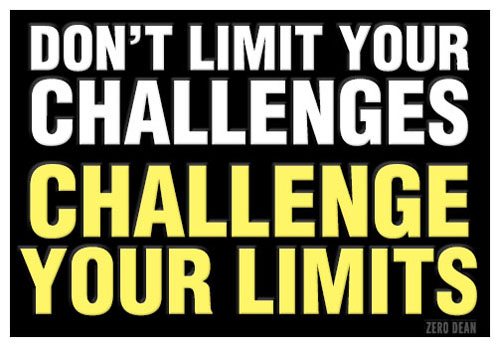Change Your Mindset
How The Power of Focus Can Lead You To Success

“You will get what you want, when you stop making excuses on why you don’t have it.”
How do you wake up in the morning?
Do you jump out of bed and look forward to starting the day?
Do you wake up in the morning and you did not want to get out of bed, hear the alarm clock ring and you press the snooze button over and over again until you are forced to get up and go to the bathroom?
Or wake up even more tired?
With the busy life style that we lead today, most of the time human beings are operating on autopilot, seldom do we stop and ask ourselves essential questions.
In addition we are being constantly bombarded with information (breaking news, whatsapp messages, tweets, emails…) and we are reacting to the situations, that our lives are being controlled by external environment that we have forgotten simple concepts of life.
What do you think about when you wake up?
Do you think about all the things you need to do, the list is endless and you feel overwhelmed before you get out of bed.
Or
You wake up in the morning, thinking about all the challenges that you are facing in your life, think about all the critics that people have given you, even the areas where you have not succeeded. Then you feel discouraged and de-motivated.
Or
Think about what is missing in our lives not enough money, no big title (Director, CEO) after your name or you do not have a flashy car and so on.
When faced with a problem what do you do?
Spend time discussing and analyzing the problem in great depth and then defining it in unsolvable terms?
Or do you find out who is to blame?
Our thoughts
Human beings think between 50,000- 70,000 thoughts a day (mental chatter, images or movies playing in our head) 95% of these thoughts are repetitive of previous days and 80% of the habitual thoughts are negative.
In order to achieve success we need to learn how to focus these thoughts on what we want.

Story
One day the Zen master wanted to show his students a new technique of shooting an arrow. He told his students to cover his eyes with a cloth and then he shot his arrow. When he opened his eyes, he saw the target with no arrow in it and when he looked at his students, they looked embarrassed because their teacher had missed.
The Zen master asked them, “What lesson do you think I intend to teach you all today?” They answered, “We thought you would show us how to shoot at the target without looking.” The Zen master said, “No, I taught you that if you want to be successful in life, don’t forget the target. You have to keep an eye on the target, otherwise you may miss a good opportunity in life.” They looked at each other, impressed with the lesson.
The moral of the story is we need to consistently focus on what we want and we need to realize that :
- What thoughts we focus on we FEEL, therefore our thoughts have a direct effect on our emotions
- What we focus on and feel we attract in our lives. Our destiny is consistently shaped by our thoughts.
“Challenges are what make life interesting and overcoming them is what makes life meaningful.” – Joshua J. Marine
Tips: How to control the FOCUS of your thoughts
When faced with a challenge or a problem spend 5% of your time discussing the problem, 95% of your time finding innovative and creative solutions. Remember “The problem is not the problem. The problem is your attitude to the problem”
Ensure that you do the following on a daily basis:
Learn something new on a daily basis. Learning does not end when you obtain your degree or leave university. The journey of life is a learning process, successful people converted their failures into stepping stones by learning from it and moving on. When you try something and it does not work out, do not despair, all you have to do is find a better way to do it.
Enjoy – Ensure that on a daily basis that you are able to enjoy and have fun. You have the ability to create memorable moments on a daily basis. Remember
“life is not measured by the number of breaths we take, but how many moments that take our breath away”
Appreciate – As soon as we develop a sense of appreciation (gratitude), we are shifting our focus of thoughts on what we have and what we have been able to achieve.
Reflect on your life. “An unexamined life is not worth living” Socrates. Reflection allows for self assessment, checking that you are on the right track. Reflection gives you time to monitor your thoughts and actions, to check whether they are in alignment with your purpose in life.
Negative thoughts have a way of coming when you least expect it to. People spend too much time thinking about what happen to them in the past or the possibility of negative things happening to them in the future.
To get rid of these negative thoughts ask yourself one QUESTION “If this was my LAST day alive, what would I Love to do..” then go and do it.
Do not postpone living.
Life
10 Research-Backed Steps to Create Real Change This New Year
This New Year could finally be the one where you break old patterns and create real, lasting change.

Every New Year, we make plans and set goals, but often repeat old patterns. (more…)
Change Your Mindset
The Silent Skill That Makes People Respect You Instantly
What truly earns respect and why most people go about it the wrong way

Everybody craves respect but not everyone earns it. Some people believe that a title, years of experience, or a position of authority automatically entitles them to respect. (more…)
Change Your Mindset
How to Turn Your Mind Into Your Greatest Asset (Instead of Your Enemy)
The thoughts you feed your mind today quietly become the life you live tomorrow.

The human mind has two parts: the conscious mind and the subconscious mind. Both work together, but each has a very distinct role in shaping your life, decisions, habits, and results. (more…)
Did You Know
The Success Patterns You Inherited (And Didn’t Notice)
Your family history may hold the key to why you think, act, and feel the way you do today.

Who are you? Your experiences and your family’s narratives and legacies contribute to your identity. Your ancestry contains individual traits and forces that have been inherited over the years. It also carries the fights and victories of your forebears and older family members. (more…)
-

 Did You Know4 weeks ago
Did You Know4 weeks agoHow Skilled Migrants Are Building Successful Careers After Moving Countries
-

 Health & Fitness6 days ago
Health & Fitness6 days agoWhat Minimalism Actually Means for Your Wellness Choices
-

 Did You Know4 days ago
Did You Know4 days agoWhy Most Online Courses Fail and How to Fix Them
-

 Business5 days ago
Business5 days agoIf Your Business Internet Keeps Letting You Down, Read This
-

 News1 day ago
News1 day agoBrandon Willington Builds 7-Figure Business by Ignoring Almost Everything

























10 Comments